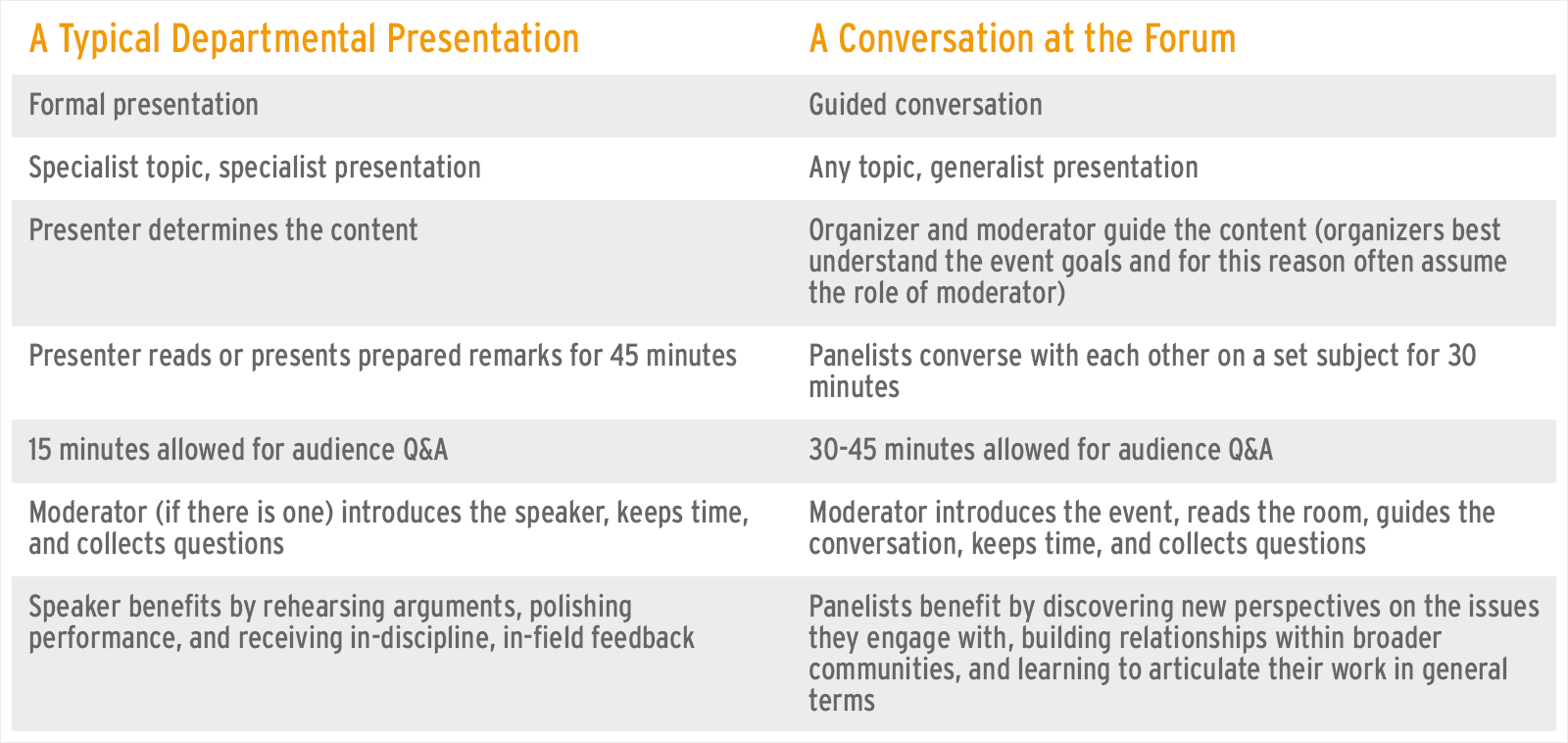Our Model
All are welcome
Our conversations take shape as public forums, live readings, performances, workshops, demonstrations, exhibits, and other forms of exchanging ideas.
Our Commitment
Gain New Perspectives.
We make the commitment to our audiences that they can attend without prior knowledge of the topic, be welcomed into the discussion, and leave having learned something new.
Help Others.
Our format encourages audience members for whom the topic is unfamiliar to help panelists articulate their knowledge and perspectives in the clearest possible ways.
Make Connections.
Conversations at the Forum facilitate trans-disciplinary connections within the university, inviting faculty and students to cross boundaries and attend events focused on questions and fields beyond their specializations.
Our Format
Conversations at the Forum Are Rarely Academic Talks.
Because of our commitment to our audiences, traditional forms of academic presentation generally do not work at the Forum. We host and organize events in a variety of formats, from the standard panel discussion to the public forum, the live reading or performance, the hands-on workshop or demonstration, or the pop-up exhibit. Below are the key differences between conventional academic talks and conversations at the Forum:
For Organizers
What topics make for good non-specialist events?
Any topic can be engaging. The communities that gather for our programs are energetic, creative, and curious. The format of the discussion and the preparedness of the presenters will be the most important determinants of a community’s level of engagement with a program.
When tackling potentially controversial topics, especially for programs responding quickly to broader debates, the key is to start with well-posed, focused, and concrete questions that center the knowledge of the panelists you have chosen. This provides a foundation for broader discussions to emerge. When the conversation between panelists takes on the right tone of respect and exchange, the audience generally responds in kind during the Q&A.
What are the key ingredients of a successful program?
Below are the qualities that we think create a program that is fulfilling for all involved:
Intentionality. Know why you’re creating a program and communicate those goals in your planning and advertising. This will help ensure that everyone involved has realistic expectations of the experience.
Flexibility. Unexpected opportunities emerge. Unanticipated hurdles arise. Remain attentive to the goals you set for your program, read the room, and respond thoughtfully to unforeseen circumstances.
Generosity. A lot of work goes into even the simplest programs, and everyone in attendance puts forth some effort to be there. Respect that time and effort. Listen and respond to what you hear. Show appreciation for the gift of attention others are giving to your event by staying on schedule, staying on topic, and being alert to the needs of participants.
I’m organizing an event. How do I choose a guest panelist?
We aim for our programs to feel like conversations. If you’ve seen or heard your proposed guest speak with ease (and without a lot of jargon) about their work, then they’ll likely be a good fit for a Forum event. If you ask them and they’re not sure, you can send them to our website for examples of events we’re sponsoring and you can direct them to our YouTube channel to see videos of past discussions in our space. This will help them evaluate if a Forum discussion is something they really want to do. If they seem reluctant, maybe it would be better to invite them to give a department seminar instead.
If you’re inviting multiple presenters, it often works well to bring in people with different backgrounds and styles — a journalist, a scholar, a musician, an activist — because the process of them finding a common space for discussion is particularly engaging. When inviting multiple panelists, it is very important to provide a clear explanation of what you hope to accomplish in the conversation and what you are hoping each of them will speak to. That way, each person has a sense of where the conversation is going and an understanding of where gaps in their own knowledge might be filled by others.
For Moderators
What is the role of the moderator in conversations at the Forum?
We strongly recommend that you include a moderator as part of your program. (An event organizer can also fill the role of moderator.) The moderator will set the tone for the program. They do not need deep knowledge of the subject, but they do need to know how to frame questions that will draw out the panelists’ expertise, as well as how to maintain a respectful atmosphere among audience members and panelists. The most effective moderators collaborate with the event organizer to outline a plan for the program and communicate that plan to the presenters in advance. Moderators also communicate with the audience, establish the room rules, and manage conversation flow.
For Presenters
I’ve been invited to partipate at the Forum. How should I prepare?
It’s important to remember that you’re preparing for a conversation with community members who may have no background knowledge of your topic. Do not prepare a formal paper or formal remarks that you plan to read. Instead, plan to speak about your work in an organized, but informal, way. We usually advise organizers to allow approximately 30 minutes for formal discussion (ideally structured as a Q&A with a moderator or a conversation with multiple panelists) before opening up the conversation to questions from the audience.

check us out
on social media